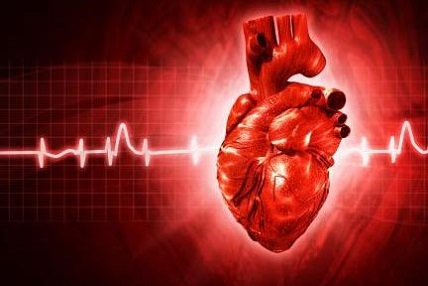Nikhil Prasad Fact checked by:Thailand Medical News Team Aug 23, 2024 7 months, 3 weeks, 16 hours, 29 minutes ago
Medical News: SARS-CoV-2 Disrupts Your Heart's Beat
COVID-19, caused by the SARS-CoV-2 virus, has been a focal point of global research due to its profound impact on various organs and systems in the human body. Among its most concerning effects are its disruptions to the cardiovascular system, specifically in causing cardiac arrhythmias. This Medical News report delves into a recent study conducted by researchers from the Carol Davila University of Medicine and Pharmacy in Romania, which explores the intricate relationship between SARS-CoV-2 and arrhythmogenesis - how the virus can lead to irregular heartbeats, increasing the risk of severe outcomes for patients.
 Romanian study review uncovers how COVID-19 leads to arrhythmogenesis
Thailand Medical News
Romanian study review uncovers how COVID-19 leads to arrhythmogenesis
Thailand Medical News has previously covered numerous studies on various aspects of COVID-19 induced cardiac arrhythmias.
https://www.thailandmedical.news/news/covid-19-news-swedish-study-validates-that-sars-cov-2-infections-causes-increased-risk-of-arrhythmias
https://www.thailandmedical.news/news/covid-19-news-israeli-study-finds-that-sars-cov-2-infections-can-trigger-new-onset-atrial-fibrillation
https://www.thailandmedical.news/news/mechanisms-that-trigger-cardiac-arrhythmia-in-covid-19
https://www.thailandmedical.news/news/latest-covid-19-news-sars-cov-2-causes-heart-muscle-cells-cardiomyocytes-to-fuse-and-disrupts-heart-s-electrical-rhythm
https://www.thailandmedical.news/news/breaking-new-york-study-finds-that-sars-cov-2-virus-damages-heart-pacemaker-cells-and-causes-arrhythmias
https://www.thailandmedical.news/news/arrhythmia-university-of-pennsylvania-researchers-say-that-critical-covid-19-patients-are-10-times-more-likely-to-develop-cardiac-arrest
https://www.thailandmedical.news/news/covid-19-news-researchers-warn-that-unique-types-of-sars-cov-2-related-arrhythmias-known-as-
fascicular-tachycardia-are-materializing-in-children
https://www.thailandmedical.news/news/covid-19-news-mayo-clinic-study-shows-that-sars-cov-2-spike-protein-mediates-cardiomyocyte-fusion-leading-to-increased-arrhythmic-risk
https://www.thailandmedical.news/news/chinese-scientists-uncover-how-covid-19-triggers-arrhythmia
The Connection Between COVID-19 and Arrhythmias
The Romanian study in focus was aimed at understanding how SARS-CoV-2 affects the heart, particularly in causing arrhythmias, which are disturbances in the normal rhythm of the heart. These disturbances can vary from benign to life-threatening and are of particular concern because they do not always correlate with the severity of respiratory symptoms in COVID-19 patients. The researchers emphasize the need for greater awareness and targeted therapeutic interventions to mitigate the risks associated with these heart rhythm disturbances.
Pathophysiology of SARS-CoV-2 and Cardiac Arrhythmias
SARS-CoV-2 primarily targets the respiratory system but has significant effects on the cardiovascular system as well. The virus uses the angiotensin-converting enzyme 2 (ACE2) receptor to enter cells. This receptor is abundantly expressed in the heart, especially in the cardiomyocytes (heart muscle cells) and pericytes (cells that wrap around blood vessels). The presence of these receptors in the heart cells makes them susceptible to infection by SARS-CoV-2, which can lead to direct damage to the heart tissue and subsequent arrhythmias.
One of the critical findings from the study was that patients with preexisting heart conditions showed higher levels of ACE2 expression, making them more vulnerable to severe cardiac complications when infected with SARS-CoV-2. This highlights the importance of monitoring heart health in COVID-19 patients, especially those with underlying cardiovascular conditions.
Study Methodology
The researchers conducted a systematic review of existing literature to compile data on the incidence and types of arrhythmias observed in COVID-19 patients. They followed the Preferred Reporting Items for Systematic Reviews and Meta-Analyses (PRISMA) guidelines to ensure a thorough and unbiased selection of studies. Out of an initial pool of 266 studies, 22 were included in the final analysis. These studies provided insights into the various mechanisms through which SARS-CoV-2 can disrupt the electrical activity of the heart.
Key Findings from the Study
The study revealed several critical insights into how COVID-19 can lead to arrhythmias:
-Direct Viral Infection of Heart Cells: SARS-CoV-2 can infect cardiomyocytes directly, leading to inflammation and damage that predisposes patients to arrhythmias. The virus’s ability to bind to ACE2 receptors on heart cells facilitates this infection.
-Increased Susceptibility in Patients with Heart Disease: Patients with preexisting heart conditions showed higher levels of ACE2 expression, making them more susceptible to arrhythmias when infected with COVID-19. This finding suggests that COVID-19 could exacerbate existing cardiovascular issues, leading to more severe outcomes.
-Inflammation and Immune Response: The inflammatory response triggered by SARS-CoV-2, often referred to as a "cytokine storm," can also contribute to arrhythmias. Elevated levels of inflammatory markers like interleukin-6 (IL-6) were associated with a higher incidence of heart rhythm disturbances.
-Role of Hypoxia: The study found that hypoxia, a condition characterized by low oxygen levels in the blood, commonly observed in severe COVID-19 cases, could also lead to arrhythmias. Hypoxia affects the heart’s ability to maintain a regular rhythm, potentially leading to life-threatening conditions.
-Impact of Medications: Some of the medications used to treat COVID-19, such as hydroxychloroquine and azithromycin, were initially linked to arrhythmias due to their potential to prolong the QT interval, a measure of the heart's electrical cycle. However, their use has since been discouraged due to these risks.
Implications for Treatment and Care
Understanding the mechanisms behind SARS-CoV-2-induced arrhythmias is crucial for managing COVID-19 patients, particularly those with existing cardiovascular conditions. The study suggests that monitoring heart health in COVID-19 patients should be a priority, with special attention given to those showing signs of cardiac stress, such as elevated troponin levels or prolonged QT intervals.
Moreover, the findings underscore the importance of personalized treatment approaches. Patients with higher levels of inflammatory markers or who are at risk of hypoxia may benefit from more aggressive monitoring and intervention strategies to prevent arrhythmias.
Conclusion
The study’s findings emphasize the complex relationship between COVID-19 and cardiac arrhythmias, shedding light on the various factors that contribute to these disturbances. As researchers continue to unravel the pathophysiology of SARS-CoV-2, it is becoming increasingly clear that the virus's impact extends far beyond the respiratory system, with significant implications for heart health.
Further research is needed to fully understand the long-term cardiovascular effects of COVID-19 and to develop targeted therapies that can reduce the risk of arrhythmias in infected patients. For healthcare providers, these insights offer a valuable framework for managing COVID-19 patients, particularly those at high risk of cardiac complications.
The study findings were published in the peer-reviewed journal GERMS.
https://www.germs.ro/en/Articles/Pathophysiological-correlations-between-SARS-CoV-2-and-arrhythmogenesis-a-literature-review-2202#text
For the latest COVID-19 Research, keep on logging to
Thailand Medical News.
Read Also:
https://www.thailandmedical.news/news/breaking-45-percent-of-individuals-who-get-hospitalized-for-heart-arrhythmia-typically-die-within-the-next-ten-years
https://www.thailandmedical.news/news/warning-covid-19-clinical-care-experimental-drugs-being-tried-for-covid-19-can-cause-dangerous-abnormal-heart-rhythms
https://www.thailandmedical.news/news/cleveland-clinic-and-northwestern-university-study-shows-that-metformin-could-be-repurposed-to-treat-atrial-fibrillation-findings-relevant-in-covid-se
https://www.thailandmedical.news/news/italian-and-swiss-researchers-warn-that-covid-19-mrna-vaccines-can-lead-to-arrhythmias
https://www.thailandmedical.news/news/viral-infections-can-lead-to-arrhythmias-and-cardiac-deaths-in-early-stages-of-infections-even-before-myocarditis-sets-in
https://www.thailandmedical.news/news/atrial-fibrillation-significantly-increases-mortality-risk-in-severe-covid-19-cases-
